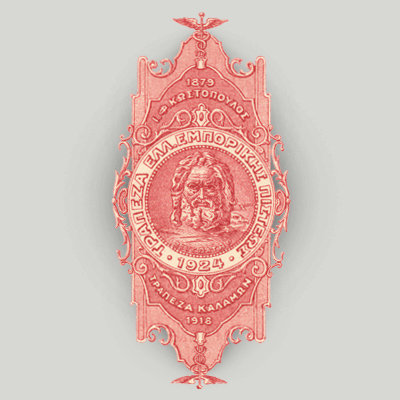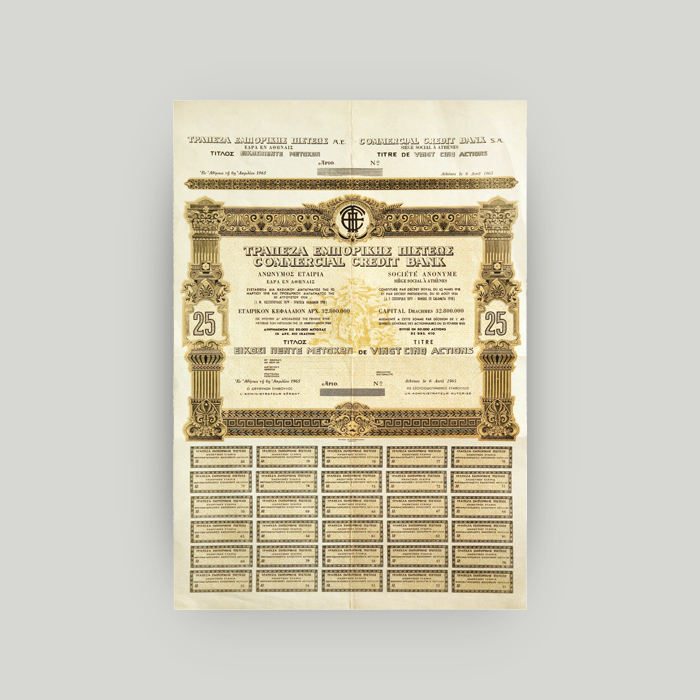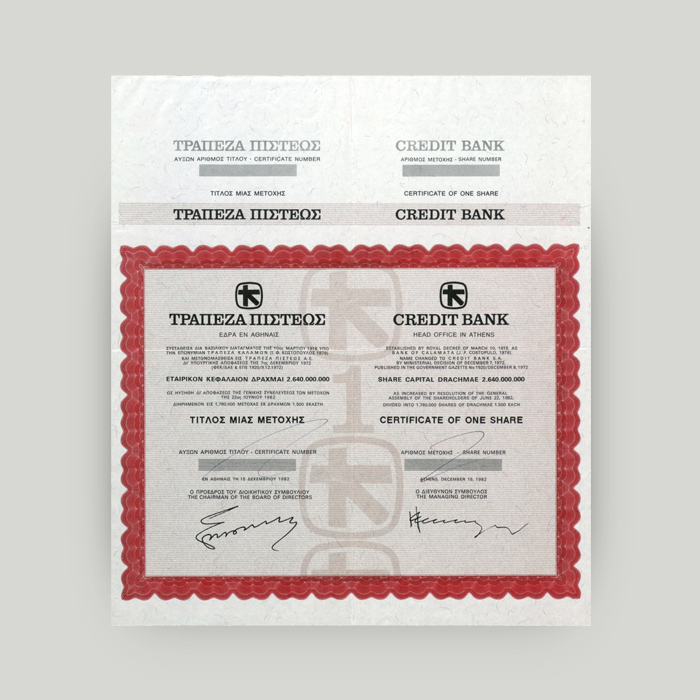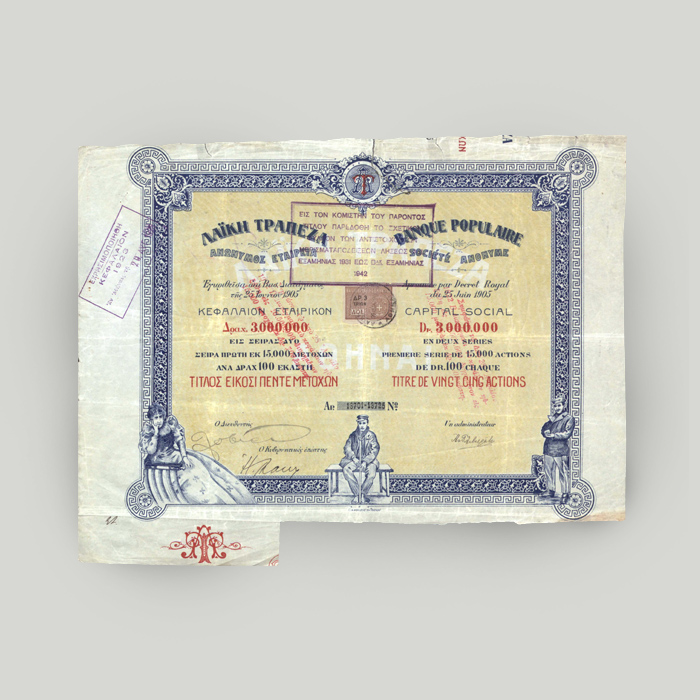Brief history of Banque de Crédit Commercial Hellénique
Not long after it was established, the Banque de Crédit Commercial Hellénique network included branches in most areas of the Peloponnese. During the Great Depression in 1929-1932, the bank managed to weather the storm suffering only minimal losses. The Banque de Crédit Commercial Hellénique 1924 logo commemorates the 2 undertakings that were merged to create it.
This is the Banque de Crédit Commercial Hellénique logo as it appeared on a cheque stub.
The Greek god Zeus is depicted in the centre within a circular border. An eagle emerges behind the god’s shoulder amongst lightning bolts, Zeus’ symbol of power. The depiction legend reads “ΖΕΥΣ ΠΑΤΗΡ” (Ancient Greek for “Father Zeus”).
The text encircling the design reads the bank’s name and the year it was established, 1924.
In the spaces above and beneath the central design, the undertakings that merged to create the new bank are mentioned: the banking section of the commercial firm J. F. Costopoulos and Kalamon Bank. The names are accompanied by the years of establishment: 1879 and 1918, respectively.
The artwork was created by Georgios Prokopiou.
Zeus continued to appear as a theme in the bank logo until the 1950s.
The beginnings of a new bank
Banque de Crédit Commercial Hellénique, present-day Alpha Bank, was founded in September 1924 as a result of a merger between the commercial firm J. F. Costopoulos and Kalamon Bank. The bank was based in Athens.
In 1925 Banque de Crédit Commercial Hellénique was listed on the Athens Stock Exchange. The bank was now able to benefit from the booming capital market of Greece.
Very soon, the bank network had branches in most areas of the Peloponnese.
As of 1929, a unified accounting plan was adopted throughout the network. At the same time, the bank started a campaign to advertise the benefits of saving money.
The Great Depression (1929-1932)
As a result of the 1929 economic crisis, panic spread causing a run on the banks. No bank was left unscathed.
Banque de Crédit Commercial Hellénique was able to cover withdrawals made at the Kalamata, Messini and Meligalas branches without resorting to borrowing.
After the 1929-1932 Depression, Banque de Crédit Commercial Hellénique not only avoided the slightest risk of default, but also managed to cope without even resorting to a reduction of its own funds to counterbalance losses suffered during the previous period.
An effort to regroup
In a move that would underline its leading position in the market, the bank relocated to its privately owned Athens headquarters in May 1932. It also made a point of celebrating the event with as much press coverage as possible.
From 1933 onwards, the bank started to seek partnerships with insurance companies to the end of further expanding its operations.
The most decisive step in the insurance sector was taken in 1939. That is when the bank founded its very own insurance company under the name “Emporiki Greek General Insurance SA”.
Hardship during WWII and the German Occupation
Throughout the German Occupation, the bank made a sustained effort to pay employee salaries on a regular basis. When the effect of pay rises was nullified by rampant hyperinflation, the bank organised breadlines for its employees. Breadlines were later replaced by the distribution of rationing coupons.
By late 1943, Banque de Crédit Commercial Hellénique nearly found itself on the brink of default. A merger with the Bank of Chios was pursued as a possible solution. However, the merger did not go through.
The gradual return to normal in the wake of war
After the occupation troops left the country, the bank found itself in limbo. Nearly all its previously owned securities had been sold.
An extraordinary general meeting was convened on 19 December 1944. The resolution of the bank would be on the table. However, this scenario did not come to pass, as Athens was plunged into turmoil during the civil clashes known as the Dekemvriana. Following the Treaty of Varkiza, the decision to resolve the bank was revoked.
From 1946 onwards, the bank’s operations were gradually restored. The next year saw the consolidation of its activities and its name changed to Commercial Credit Bank.
More information on Banque de Crédit Commercial Hellénique is available in our publications:
- With Wisdom and Vision: ALPHA BANK, 19th – 21st Century, academic advisor: Kostas Kostis. The publication narrates the history of Alpha Bank, from founder J. F. Costopoulos’ first commercial ventures in the 19th century through to the present day. It also includes a wealth of unpublished photographic material, mainly from the Alpha Bank Historical Archives.
Buy the publication With Wisdom and Vision: ALPHA BANK, 19th – 21st Century on the Alpha Bank e-shop. - Alpha Bank/History I: Banque de Crédit Commercial Hellénique, 1924-1947, edited by Andromache Theodoropoulou, Anastasios Stergiou, Loukia Frosynou. This leaflet includes a selection of commemorative items, photos, documents and artwork that constitute part of the rich material available to the Historical Archives. It also includes a timeline of the milestones that determined the course of the bank over those crucial years.
The leaflet was published to accompany the exhibition of the same name held at the exhibition space of the Alpha Bank headquarters in Athens, from November 2010 to May 2011.
Buy the publication Alpha Bank/History Ι: Banque de Crédit Commercial Hellénique, 1924-1947 on the Alpha Bank e-shop.
The Alpha Bank Historical Archives are not open to the public.
Research visits can be organised upon request.
Contact us to request a visit.






